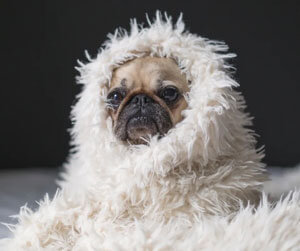Winter’s almost over
 Winter can be tough on all of us.
Winter can be tough on all of us.
If you can, just snuggle with your beastie all winter long.
But if you must go out, here are a few tips!
General Cold Weather Care Tips
- Outdoors:
- Don’t leave your pet outdoors for extended periods of time. If it’s too cold for you, it’s probably too cold for your pet.
- Never leave your pet in the car during cold winter days. The car keeps cold air trapped in and can cause serious health problems.
- Make sure your pet’s identification is on and up to date with your contact information in case they get separated from you.
- Indoors:
- Make sure pet bedding is kept away from cold drafty areas of the home.
- A humidifier can prevent dry, itchy, flakey skin.
- Other Animal Issues:
- This time of year wildlife may come closer to your warmer homes. Keep an eye out for any wildlife visitors before letting your pet outdoors.
- Be sure to bang on your car hood before you start your engine to give cats and other animals a chance to escape.
- If you care for any outdoor animals, be sure there is always clean, fresh, unfrozen water available with a heated bowl , and a properly sheltered area to rest.
Special Winter Paw Care
Pets’ paws need special attention during winter months! Dryness, cracking, and peeling from the cold ground, chemicals and salts used on sidewalks, or frostbite conditions, can lead to terrible pain or injury.
- If you see any of the following signs, call our office for an exam :
- Swelling, redness, or bleeding of the feet,
- Discoloration of the skin, or blisters/ulcers on the toes or pads,
- Limping or pain when touched.
- To prevent paw problems:
- Keep snow and ice from sticking to the paws and feet by keeping hair trimmed short on the paws and between the toes.
- Keep nails trimmed to prevent slipping on the ice from overgrown nails.
- Use a protective pet paw balm or petroleum jelly on the underside of the paws before going outdoors.
- Research paw boots . Not all pets will use these, but they can be helpful if your pet will tolerate them.
- When coming in from outdoors, wipe off their feet with a pet-safe wipe or wash and dry them well. If they are a shorter breed, be sure to wipe the belly too!
Winter Toxins
- Salt-based ice melt: Wipe paws off when coming back in from outdoors. Try using Pet Safe Ice Melts where you can.
- Antifreeze: Be sure to clean any spills right away.
- Rodenticides (Rat Poisons): Keep rodent poisons out of reach of your pet, or use humane traps for pests.
Winter doesn’t mean you should stop your flea and heartworm prevention.
- It’s best to keep pets on a flea, tick, and heartworm preventative all year round, but if your pet’s preventative has lapsed, make sure to get them back on it.
- Heartworm Disease in dogs and cats is caused by mosquitos. It just takes a few days of mild weather for mosquitos to hatch, so it’s not uncommon to see them during winter months.
- When you’re picking a product though, make sure it is appropriate for your pet. Call our office for more information on what product is safe and effective for your pet.
Additional Winter Pet Safety Information:
Pet Poison Helpline Link (888) 426-4435
Recent Posts
About Us
Animal Family Veterinary Care offers an extensive range of services all in one place, so we can meet your pet’s needs in almost every situation. Our veterinarians in Davenport treat dogs, cats, rabbits, birds, and a variety of other exotic species, because every pet is unique and important.